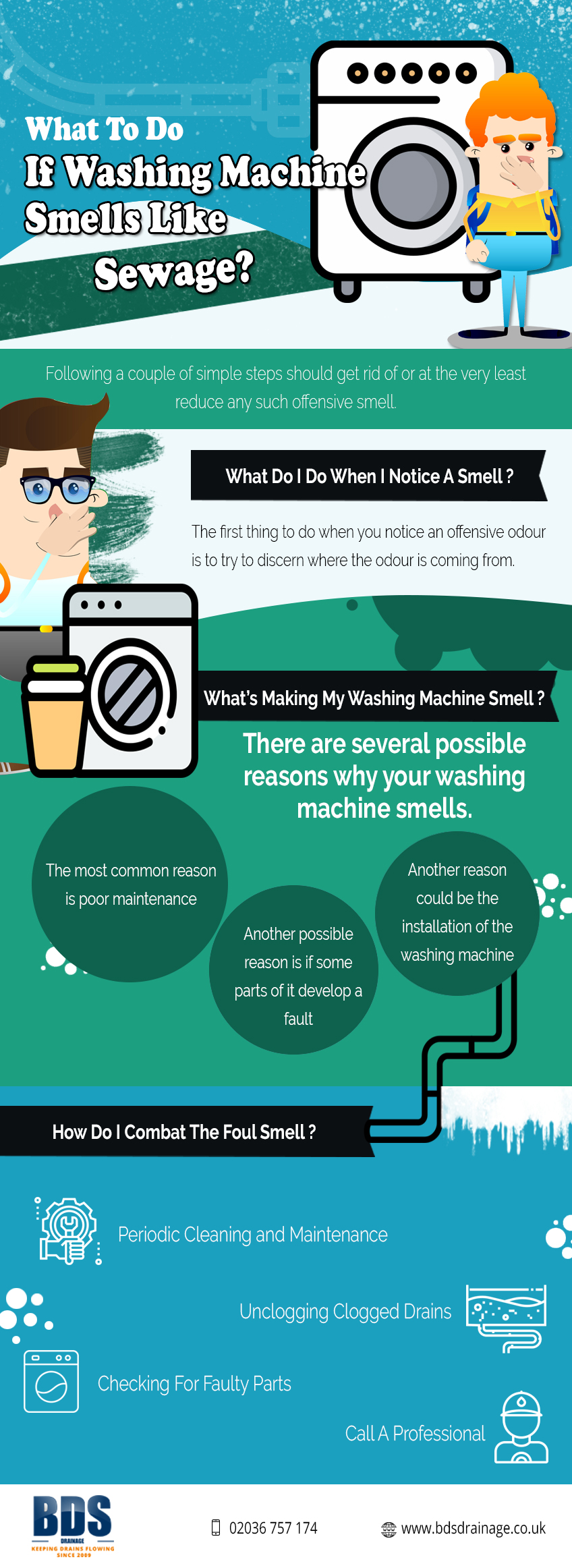Ever opened your washing machine only to be greeted by an unpleasant sewer-like smell? It’s not exactly the fresh laundry experience you were hoping for, right?
This unexpected odor can turn a routine chore into a perplexing problem. But don’t worry, you’re not alone in this. Many people face the same issue and wonder why their trusty appliance has developed such an undesirable scent. We’ll dive into the reasons behind this stinky situation and more importantly, how you can fix it.
Understanding what’s causing the smell can save you from unnecessary stress and keep your clothes smelling fresh. So, if you’re tired of holding your breath every time you do laundry, read on. You’ll soon discover simple solutions to reclaim that fresh laundry fragrance you love.
Common Causes Of Sewer Smell
Sewer smells from washing machines often stem from mold buildup or clogged drains. Stagnant water in the pipes can also be a culprit. Regular cleaning and maintenance help prevent these unpleasant odors.
If you’ve ever wondered why your washing machine smells like sewer, you’re not alone. This unpleasant odor can disrupt the comfort of your home and is often a sign of underlying issues. Understanding the common causes of this smell can help you tackle it effectively.
Clogged Drain Pipes
A common culprit behind the sewer smell in your washing machine is clogged drain pipes. When debris, lint, and soap scum accumulate, they can block the water flow. This creates a perfect breeding ground for bacteria, leading to foul odors. Check the drain pipes regularly and remove any blockages. You might be surprised how much grime can build up over time. Using a plumbing snake or a similar tool can help clear these clogs efficiently.
Blocked Filters
Blocked filters can also be a reason for that sewer-like smell. Filters are designed to catch lint and other particles, preventing them from clogging the drain. However, when they become blocked, water can stagnate, causing odors. Make it a habit to clean the filters every month. It’s a simple task that can prevent bigger issues down the line. Have you ever cleaned your machine’s filter and found a forgotten sock or a few coins? These items can cause blockages and contribute to the smell.
Mold And Mildew Growth
Mold and mildew growth is another common cause of unpleasant odors in washing machines. These fungi thrive in damp environments, and your washer provides the perfect conditions. They often build up in the rubber seals and detergent dispensers. Leave the washer door open after each use to let it dry out. Consider running an empty hot water cycle with a cup of white vinegar to clean the interior. Do you ever notice a musty smell when you open your washer door? That’s a sign it’s time for a thorough cleaning. Understanding these causes can help you keep your washing machine fresh and odor-free. Regular maintenance not only prevents smells but also extends the life of your appliance. What steps will you take today to ensure your machine stays clean and functional?

Credit: bdsdrainage.co.uk
Identifying The Source Of The Smell
Have you ever walked into your laundry room, excited to tackle your mountain of clothes, only to be hit by a stench reminiscent of a sewer? You’re not alone. Figuring out the source of this unpleasant odor can be the key to restoring freshness to your laundry routine. Let’s explore how you can identify what’s causing your washing machine to smell like a sewer.
Inspecting The Machine’s Interior
Start by opening the door of your washing machine and giving the interior a good look. Check the drum for any trapped debris or leftover detergent. These can become breeding grounds for bacteria, leading to unpleasant smells. Use a flashlight to look into the crevices and under the rubber gasket. Have you noticed any mold or mildew? That could be your culprit.
Run your fingers along the surfaces to check for slimy residue. If you’ve ever skipped cleaning the machine after a cycle, residue might accumulate over time. This buildup can result in a foul odor. A regular wipe-down can save you from these surprises.
Checking The Drain Hose
The drain hose often hides in plain sight, quietly doing its job. But when it gets clogged, it can trap waste water, leading to a sewer-like smell. Is the hose kinked or blocked? A simple inspection can reveal if water is draining properly.
Disconnect the hose carefully and inspect it for any blockages. Cleaning it thoroughly might be necessary if you’ve discovered debris or buildup. Regularly maintaining the hose can prevent future odors and ensure your washing machine runs smoothly.
Examining The Filter
Did you know your washing machine has a filter that catches lint and debris? Overlooking this small component can lead to big odor problems. Check the filter for any trapped particles or buildup. Have you cleaned it recently?
Removing the filter and rinsing it under warm water can work wonders. Keeping the filter clean not only prevents smells but also improves your machine’s efficiency. Are you ready to commit to regular filter checks?
By pinpointing the source of the smell, you can take actionable steps to eliminate it. Imagine the satisfaction of walking into your laundry room and breathing in the crisp, clean air once again. What’s the next step you’ll take to banish the sewer smell from your washing machine?
Preventive Measures
Have you ever walked into your laundry room and been greeted by the unpleasant smell of sewer gas? It’s a situation that no one wants to encounter. Fortunately, there are preventive measures you can take to ensure your washing machine stays fresh and odor-free. Let’s dive into some practical steps that can help you maintain a pleasant laundry experience.
Regular Cleaning Routine
Your washing machine works hard to keep your clothes clean, but it also needs regular care to stay in top shape. Consider adding a monthly cleaning routine to your schedule. Use a solution of vinegar and baking soda. Run an empty cycle with hot water to eliminate any buildup. This simple habit can go a long way in preventing unpleasant smells from taking over your laundry room.
Using Appropriate Detergents
Not all detergents are created equal, and using the wrong type can contribute to odor issues. Make sure you’re using a detergent designed for your specific washing machine. High-efficiency machines need low-sudsing detergents. Avoid using too much detergent, as excess can lead to residue buildup. A small adjustment in your laundry products can make a big difference in odor control.
Maintaining Proper Ventilation
Ever thought about how airflow affects your washing machine? Proper ventilation is crucial for preventing musty smells. Ensure that your laundry area is well-ventilated. Leave the washing machine door open after each cycle to let moisture escape. Consider installing a small fan or vent to improve air circulation. These steps can help keep your washing machine smelling fresh.
Which of these measures resonates with you the most? Implementing even just one can transform your laundry routine from a dreaded chore into a more pleasant experience. It’s time to say goodbye to those sewer-like smells for good!
Effective Cleaning Solutions
Ever noticed a sewer-like smell from your washing machine? This odor often comes from trapped dirt and detergent. Regular cleaning helps. Keep your washing machine fresh by running hot water cycles and using vinegar. Simple steps, big difference.
Is your washing machine smelling like a sewer? It’s a common problem that can turn laundry day into an unpleasant experience. But don’t worry, there are effective cleaning solutions that can tackle those nasty odors head-on. Let’s explore some practical methods to get your washing machine smelling fresh again.
Vinegar And Baking Soda Method
One of the simplest and most effective ways to clean your washing machine is using vinegar and baking soda. These household staples can work wonders. Start by adding two cups of white vinegar to the drum and run a hot water cycle. Once the cycle is complete, sprinkle half a cup of baking soda inside and run another hot cycle. This combination helps dissolve soap scum and eliminate odors. Have you ever noticed how vinegar can neutralize even the toughest smells? This method is budget-friendly and uses items you likely already have in your pantry.
Using Commercial Cleaners
If you prefer a ready-made solution, commercial cleaners can be highly effective. These products are specifically designed to tackle washing machine grime. Follow the instructions on the package for the best results. Typically, you’ll need to add the cleaner to an empty drum and run a hot cycle. Brands like Affresh and Tide offer washing machine cleaner tablets that are easy to use. While they may cost a bit more than vinegar and baking soda, they are often formulated to provide a deeper clean.
Deep Cleaning The Machine
For stubborn odors, a deep clean might be necessary. Start by cleaning the detergent drawer and any removable parts. Use warm soapy water and a brush to scrub away residue. Don’t forget to wipe the door seal, as mold and mildew often hide there. Think about the last time you cleaned the filter. A clogged filter can trap debris and cause odors. Regular maintenance can prevent future issues, so consider setting a reminder to clean it monthly. Have you tried any of these methods before? If your washing machine is still smelling like a sewer, it might be time to check for other issues like drainage problems or a clogged hose. Taking action now can save you from bigger headaches down the line.
When To Seek Professional Help
Washing machine odors can be frustrating. Sometimes the smell won’t go away. It’s crucial to know when to call a professional. Experts can solve issues that DIY fixes can’t.
Persistent Odors
Odors that don’t fade after cleaning signal deeper problems. Regular maintenance should remove smells. If the smell persists, a professional might be needed. They have tools to tackle stubborn odors. Professionals can access parts hidden from regular cleaning.
Complex Drain Issues
Drains often cause sewer-like smells. Clogs or blockages can be tricky to clear. Some issues need special equipment. Professionals can identify hidden drain problems. They ensure drains are clean and odor-free.
Faulty Machine Components
Some odors result from broken parts. Components wear out over time. Faulty parts might need replacement. Professionals can diagnose and replace these parts. They ensure the machine runs smoothly.

Credit: bdsdrainage.co.uk

Credit: inhouseplumbingcompany.com
Frequently Asked Questions
Why Does My Washing Machine Smell Bad?
Smells can come from mold, mildew, or detergent buildup. Regular cleaning helps keep odors at bay.
How To Clean A Smelly Washing Machine?
Use vinegar or baking soda to clean. Run a hot cycle. Wipe seals and dispensers regularly.
Can Sewer Smell Be Harmful In Washing Machines?
Sewer smells can indicate mold or bacteria. It’s best to address odors quickly to avoid health risks.
How Often Should I Clean My Washing Machine?
Clean monthly to prevent odors. Regular maintenance helps keep your machine fresh and efficient.
What Causes Sewer-like Smells In Washers?
Trapped water, detergent residues, or mold growth can cause sewer-like smells. Proper cleaning can eliminate these issues.
Conclusion
Solving the sewer smell in your washing machine is possible. Regular cleaning helps remove odors. Use vinegar or baking soda for a fresh scent. Check your drain pipe for clogs. Ensure the door seals are tight and clean. Leave the door open after washing to dry.
These simple steps can keep your machine smelling good. Avoid using too much detergent to prevent buildup. Stay proactive with maintenance. Your washing machine can smell fresh again. Don’t let bad odors linger. Enjoy clean clothes without worry. Keep your laundry room smelling pleasant, always.





